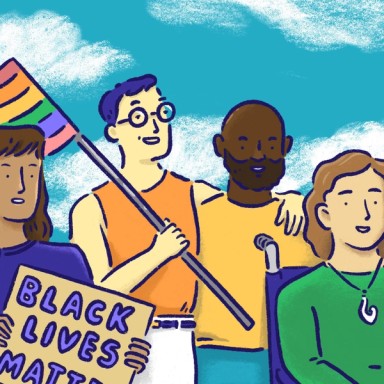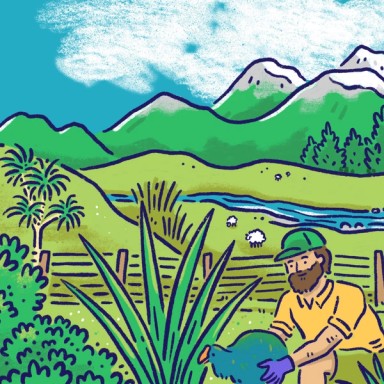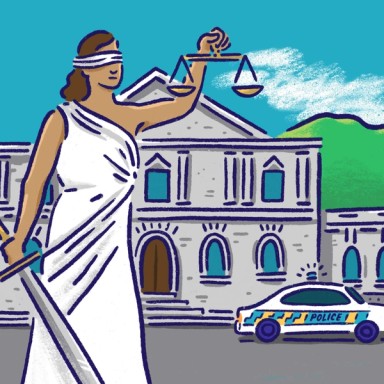
Party vote

Te ao Māori
Te Tiriti o Waitangi is the foundational document for government in NZ and it remains central to current politics. Te reo Māori is more widely heard in public and taught in schools, tikanga Māori is being recognised by the legal system, and many historical Tiriti claims have been settled. But political struggle continues, as recent debates over co-governance show. For parties on the left, co-governance represents the next step in honouring the commitments made under te Tiriti, while some parties on the right say it is a threat to democracy.

Te ao Māori
Te Tiriti o Waitangi is the foundational document for government in NZ and it remains central to current politics. Te reo Māori is more widely heard in public and taught in schools, tikanga Māori is being recognised by the legal system, and many historical Tiriti claims have been settled. But political struggle continues, as recent debates over co-governance show. For parties on the left, co-governance represents the next step in honouring the commitments made under te Tiriti, while some parties on the right say it is a threat to democracy.
Oppose co-governance
Establish a Māori legal aid service
Establish a Māori criminal justice system based on tikanga
Increase funding to Māori cultural and artistic organisations
Establish a Māori Parliament
Overhaul the Treaty of Waitangi settlement process
Return conservation land to whānau, hapū and iwi
Entrench Māori electorate seats
Appoint a Parliamentary Commissioner for the Treaty of Waitangi
Require all legislation and regulation to have Treaty impact statements
Remove the British royal family as head of state
Commit all Māori to the Māori electoral roll
Prevent referenda from overturning decisions to establish Māori wards
Oppose research or commercialisation of indigenous plants without whānau, hapū and iwi consent
Allocate half of new social housing to Māori
Adopt all Waitangi Tribunal recommendations relating to the justice system
Replace the Independent Police Conduct Authority with entity with Māori representation
Allow all prisoners to vote
Establish a Māori child protection agency
Establish an inquiry into land dispossession due to breaches of Te Tiriti
Remove the bar on historical Te Tiriti claims
Allow the Waitangi Tribunal to make non-binding recommendations regarding private land
Prevent Māori land from being forcibly taken under the Public Works Act
Abolish perpetual leases on Māori land
Pass a Climate Change Adaptation Bill
Ensure climate adaptation planning affirms tino rangatiratanga
Reform the Reserves Act to incorporate te Tiriti o Waitangi
Establish a citizens’ assembly to consider constitutional reform
Uphold Treaty rights in relation to indigenous forests on public land
Clarify the role of Te Tiriti in local government
Train public servants in te Tiriti o Waitangi and te reo Māori
Facilitate the return of wrongfully alienated land to tangata whenua
Increase funding for the Waitangi Tribunal
Abandon the 'large natural grouping' method in Treaty settlements
Implement the United Nations Declaration on the Rights of Indigenous Peoples
Establish an ocean commission to provide advice and set targets for marine systems
Abolish Te Puni Kōkiri
Replace the Office for Crown-Māori Relations with an Office of Treaty Settlements
Hold a referendum on the interpretation of the Treaty of Waitangi
Repeal all or part of the Pae Ora (Healthy Futures) Act
Repeal the Treaty of Waitangi clause in the Oranga Tamariki Act
Remove Ngāi Tahu representatives from the Canterbury Regional Council
Remove government agencies' focus on the Treaty of Waitangi
Prevent the implementation of Māori seats on Auckland Council
Ignore the UN Declaration on the Rights of Indigenous Peoples
Abolish Māori wards
Continue to invest in Te Haeata, the online database of Treaty commitments
Increase funding and support for statistical data about whānau Māori
Continue to support Māori Crown relations – Te Arawhiti
Encourage local councils and boards to create Māori wards
Protect Māori commercial and customary fishing rights
Recognise Māori expertise in indigenous development in connection with international projects
Protect indigenous intellectual property rights in trade agreements
Withdraw from the UN Declaration on the Rights of Indigenous People
Oppose co-governance
Establish a Māori legal aid service
Establish a Māori criminal justice system based on tikanga
Increase funding to Māori cultural and artistic organisations
Establish a Māori Parliament
Overhaul the Treaty of Waitangi settlement process
Return conservation land to whānau, hapū and iwi
Entrench Māori electorate seats
Appoint a Parliamentary Commissioner for the Treaty of Waitangi
Require all legislation and regulation to have Treaty impact statements
Remove the British royal family as head of state
Commit all Māori to the Māori electoral roll
Prevent referenda from overturning decisions to establish Māori wards
Oppose research or commercialisation of indigenous plants without whānau, hapū and iwi consent
Allocate half of new social housing to Māori
Adopt all Waitangi Tribunal recommendations relating to the justice system
Replace the Independent Police Conduct Authority with entity with Māori representation
Allow all prisoners to vote
Establish a Māori child protection agency
Establish an inquiry into land dispossession due to breaches of Te Tiriti
Remove the bar on historical Te Tiriti claims
Allow the Waitangi Tribunal to make non-binding recommendations regarding private land
Prevent Māori land from being forcibly taken under the Public Works Act
Abolish perpetual leases on Māori land
Pass a Climate Change Adaptation Bill
Ensure climate adaptation planning affirms tino rangatiratanga
Reform the Reserves Act to incorporate te Tiriti o Waitangi
Establish a citizens’ assembly to consider constitutional reform
Uphold Treaty rights in relation to indigenous forests on public land
Clarify the role of Te Tiriti in local government
Train public servants in te Tiriti o Waitangi and te reo Māori
Facilitate the return of wrongfully alienated land to tangata whenua
Increase funding for the Waitangi Tribunal
Abandon the 'large natural grouping' method in Treaty settlements
Implement the United Nations Declaration on the Rights of Indigenous Peoples
Establish an ocean commission to provide advice and set targets for marine systems
Abolish Te Puni Kōkiri
Replace the Office for Crown-Māori Relations with an Office of Treaty Settlements
Hold a referendum on the interpretation of the Treaty of Waitangi
Repeal all or part of the Pae Ora (Healthy Futures) Act
Repeal the Treaty of Waitangi clause in the Oranga Tamariki Act
Remove Ngāi Tahu representatives from the Canterbury Regional Council
Remove government agencies' focus on the Treaty of Waitangi
Prevent the implementation of Māori seats on Auckland Council
Ignore the UN Declaration on the Rights of Indigenous Peoples
Abolish Māori wards
Continue to invest in Te Haeata, the online database of Treaty commitments
Increase funding and support for statistical data about whānau Māori
Continue to support Māori Crown relations – Te Arawhiti
Encourage local councils and boards to create Māori wards
Protect Māori commercial and customary fishing rights
Recognise Māori expertise in indigenous development in connection with international projects
Protect indigenous intellectual property rights in trade agreements
Withdraw from the UN Declaration on the Rights of Indigenous People
Policies
Compare the parties’ positions on the key issues this election
Candidates
See the electorate candidates running in your local area
Parties
Learn about each political party, its leaders and candidate list
Compare the candidates running in your local area
Each part of the country is represented in Parliament by an electorate MP. We've asked every candidate about their priorities for your community and why they deserve your vote.












